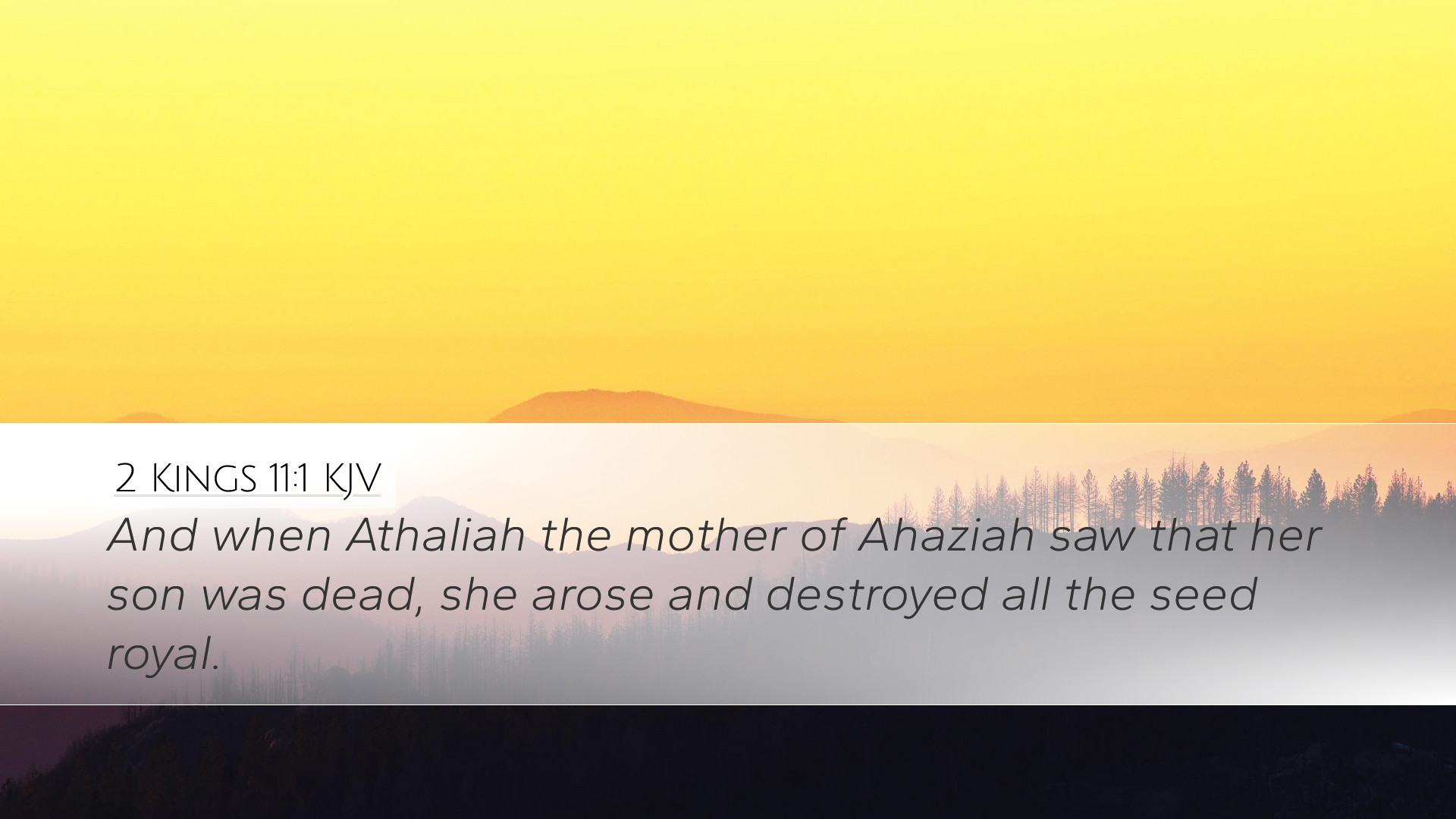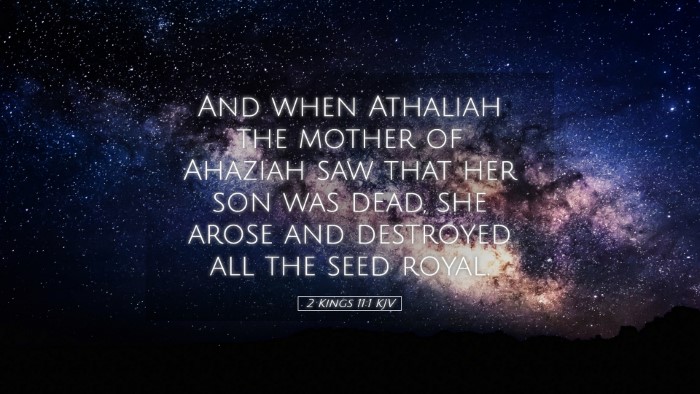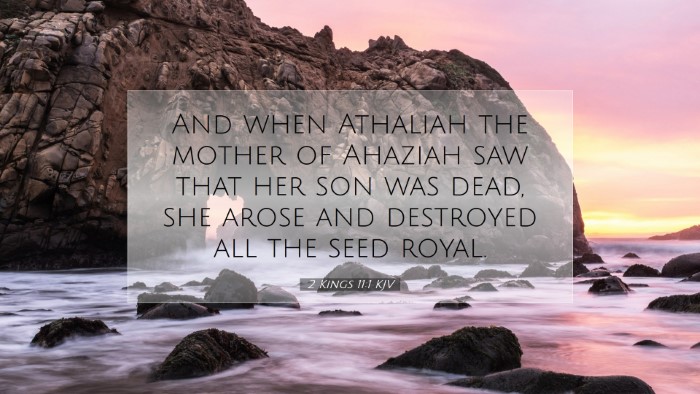Old Testament
Genesis Exodus Leviticus Numbers Deuteronomy Joshua Judges Ruth 1 Samuel 2 Samuel 1 Kings 2 Kings 1 Chronicles 2 Chronicles Ezra Nehemiah Esther Job Psalms Proverbs Ecclesiastes Song of Solomon Isaiah Jeremiah Lamentations Ezekiel Daniel Hosea Joel Amos Obadiah Jonah Micah Nahum Habakkuk Zephaniah Haggai Zechariah Malachi2 Kings 11:1
2 Kings 11:1 KJV
And when Athaliah the mother of Ahaziah saw that her son was dead, she arose and destroyed all the seed royal.
2 Kings 11:1 Bible Commentary
Commentary on 2 Kings 11:1
Verse: "And when Athaliah the mother of Ahaziah saw that her son was dead, she arose and destroyed all the seed royal." (2 Kings 11:1)
Introduction
The tumultuous period of the divided kingdom reveals the extent of human depravity and the sovereignty of God through tragic events. This single verse encapsulates the depth of Athaliah’s treachery and ambition as she seeks to eliminate the royal lineage in her quest for power. In examining this verse, we will draw insights from historical context, character studies, and theological implications.
Historical Context
The historical backdrop of 2 Kings 11 is essential to understanding the actions of Athaliah. After her son, Ahaziah, was killed, Athaliah, rather than grieving her loss, immediately took drastic and ruthless action. Public domain commentators highlight the following:
- Matthew Henry: He notes that Athaliah's action reflects not merely a personal tragedy but a political calculation aimed at securing her position. Her ruthless ambition led her to obliterate any potential rivals to the throne.
- Albert Barnes: Barnes emphasizes the significance of Athaliah as the granddaughter of Omri, who established Israel’s idolatrous practices. Her actions mark a continued lineage of wickedness that threatened the very heart of God’s covenant with David.
- Adam Clarke: Clarke observes the historical implications of this act of violence, revealing it as a turning point where Israel faces a significant crisis due to unrestrained ambition and moral decay within the royal family.
Athaliah's Character Study
Athaliah stands as a symbol of the dangers of unchecked ambition and the moral decay that can accompany a pursuit of power.
- Desperation: Her immediate violence following the death of her son signifies a desperate mindset, showcasing how ambition can drive one to extreme measures.
- Idolatry's Influence: As a proponent of Baal worship, her actions represent not just political maneuvering but a religious pursuit of power that is in direct opposition to Yahweh worship (as noted by Henry).
- Deceitfulness: Her guise as a rightful ruler while methodically eradicating the royal line can be viewed as a deceitful facade, emphasizing the dangers inherent in political ambition devoid of moral integrity (as articulated by Clarke).
Thematic Reflections
This tragic episode raises several key themes relevant for pastors and theologians:
- The Sovereignty of God: Despite the chaos and apparent success of Athaliah, God’s sovereign plan, as seen later in the chapter with the preservation of Joash, illustrates that human schemes cannot thwart divine purposes (Barnes and Henry).
- The Nature of Evil: Athaliah’s actions are a stark reminder of the nature of evil and its capacity to corrupt and destroy (“there is none that does good, no, not one” - Romans 3:12, highlighted by Clarke).
- The Preservation of the Remnant: The peril faced by the Davidic line reminds listeners of God’s promise to David and His continued preservation of a remnant, exemplifying hope amidst darkness (Henry emphasizes God's faithfulness to His covenant).
Theological Implications
This verse invites deeper theological reflection regarding the nature of leadership, the moral responsibilities of those in power, and God's overarching providence:
- Moral Responsibility: Leaders are accountable for their actions and decisions, and Athaliah’s ruthless pursuit of power serves as a warning against leading with ambition devoid of justice and righteousness.
- God’s Sovereign Purpose: The reality that God still reigns even in the midst of corruption reinforces the message of hope and redemption central to biblical theology.
- The Importance of Legacy: As the mother of a king and the grandmother of the future king, Athaliah’s actions towards her royal lineage underscore the significance of legacy and faithfulness to God’s covenant.
Practical Applications
For contemporary believers, this narrative serves as a call to vigilance and moral integrity in leadership:
- Examine Ambition: Pastors and leaders should examine their motivations and ensure that their ambitions align with God's purposes rather than personal gain.
- Seek Divine Guidance: A reminder of the importance of seeking God’s will, particularly when making crucial decisions that affect others.
- Foster a Legacy of Faith: Similar to God’s promise to preserve the remnant of David, believers are encouraged to instill faith and righteousness within their families and communities.
Conclusion
2 Kings 11:1 illustrates a critical juncture in Israel's history. Athaliah’s actions underscore the themes of ambition, evil, and divine providence. By studying this verse, leaders and scholars gain not only insight into the narrative of the Old Testament but also vital lessons applicable to leadership and faithfulness today. Each reflection from the public domain commentators enriches our understanding of the text and emphasizes God’s unyielding commitment to His people amidst human turmoil.


